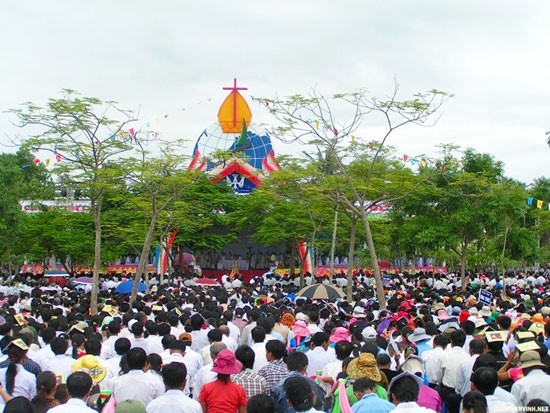(VOVworld) - The US Department of State 2011 report on International Religious Freedom released on July 30 said “the Vietnamese government did not demonstrate a trend toward either improvement or deterioration in respect for and protection of the right to religious freedom.” In addition to acknowledgements of Vietnam’s achievement in ensuring people’s right to religious freedom and beliefs, the report contains less objective comments based on distorted information about the situation in Vietnam.
 |
Many American politicians and religious leaders who have been to Vietnam acknowledge the religious freedom here. Michael Lewis Cromartie, Vice President of the US Committee on International Religious Freedom, said during his visit to Vietnam in May 2010, that religious freedom in Vietnam has made encouraging progress. Cromartie said he returned to Vietnam in 2010 after his first trip in 2007 to listen and learn about religious practices in Vietnam. He was impressed by the expansion of places of worship and religious centers. He recognized that the Vietnamese government wants to promote religious freedom and has exerted efforts to realize this aim. In September, 2011, Pastor Bob Roberts, head of the Northwood Church in Southlake, Texas, told thousand of followers attending the Global Faith Forum that Vietnamese communists respect religious freedom and Vietnam is a multi-religion nation with more than 80% of its population religious believers.
Eni Faleomaveaga, Congressman, Chairman of the US House Foreign Affairs Subcommittee on Asia, the Pacific, and the Global Environment, told a VOV correspondent in Washington: “In my recent visit to Vietnam, I attended a Catholic mass right in the middle of Ho Chi Minh city. Nowhere that I have ever found the people are being prohibited because of the religious beliefs. In fact, we have been conducted kinds of activities and services in Vietnam without any suppression from the officials of the Vietnamese government. All I know and all the time I’ve visited Vietnam, there was never an indication in my mind that any effort is made to suppress religious beliefs.”
Vietnam is a multi-religion nation with nearly 22 million religious followers, 80,000 religious leaders, and 24,000 worship centers. Since the enactment of Vietnam’s Religious Ordinance, another 16 religious organizations have been licensed, bringing the total of recognized religious organizations to 32. The US Department of State 2011 report said “the Vietnamese government facilitated the construction of hundreds of new places of worship, granted national recognition to two new religious groups, registered new congregations, permitted the expansion of charitable activities, and allowed large-scale worship services with more than 100,000 participants.”
Legally, in Vietnam, religions are equal and religious and non-religious people are equal under the law. There is no bias toward religions, or toward religious or non-religious individuals. No religion can ask the government to follow the religious model of another country. Differences in religious belief models and view points are common. Vietnam stands firm in its view that the US Department of State should not and has no right to impose its religious belief model on other countries, including Vietnam. Dang Tai Tinh, Head of the International Cooperation Department of the Government’s Religious Board says: “Each country, territory, and region has its norm, custom, and culture. In order to understand each other, we should learn each other’s culture, norm, custom, and law. We cannot impose the rule of one country on other countries.”
At a press conference in Washington last November, US Secretary of State Hillary Clinton said religious freedom is a basic human right and an essential element of a stable, peaceful, and prosperous nation. What she said is what Vietnam is doing.